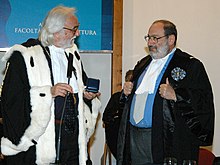
Umberto Eco, , (born 5 January 1932) is an Italian medievalist, semiotician, philosopher, literary critic, and novelist, best known for his novel The Name of the Rose (Il nome della rosa, 1980), an intellectual mystery combining semiotics in fiction, biblical analysis, medieval studies and literary theory. He has also written academic texts, children's books and many essays. Eco is President of the Scuola Superiore di Studi Umanistici, University of Bologna, member of the Accademia dei Lincei (since November 2010) and an Honorary Fellow of Kellogg College, University of Oxford.
Biograph...